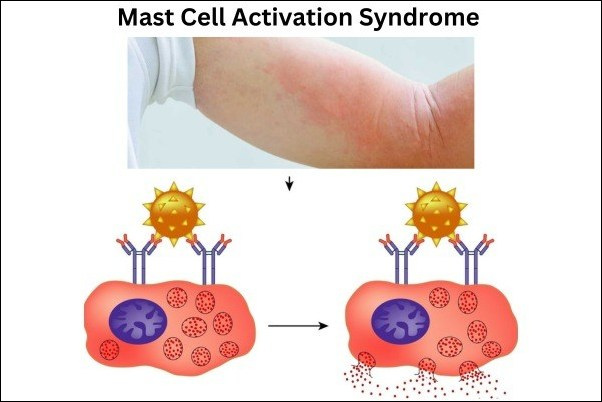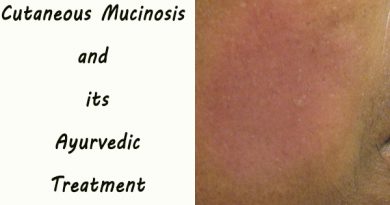Mast Cell Activation Syndrome Treatment in Ayurveda
Abstract
Mast cells are the fighters against various infections. Being a part of the immune system, they are also involved in allergic reactions. Bone marrow is the basic site for the growth of Mast cells. The other sites of growth involve GIT, skin, and airways. The lifespan of a Mast cell is more than a normal cell. When the body comes in contact with any allergen, a chemical is secreted in response by the mast cells. Histamine is a well-known anti-allergen as a response in the body. Here we will discuss the Syndrome associated with the activation of the Mast cells.

Introduction
Mast cell activation syndrome is associated with an inappropriate amount of chemicals released from the mast cells. This problem enhances the symptoms of allergy and basic other symptoms. In a healthy person, these chemicals show a positive impact and vice versa. Various factors like medications, infections, venom, stress, and food can trigger this syndrome.
Symptoms
- Blood vessel expansion
- Itching in skin
- Skin swelling
- Mucus
- Airways tightness
- Headache
- Flushing
- Diarrhoea
- Constipation
- Fast heartbeat
- Low blood pressure
- Fatigue
- Fainting
- Sweats
- Abdominal pain
Cause
The exact cause of mast cell activation syndrome is idiopathic. There is no role of allergy.
Diagnosis
Although there is no definitive diagnostic test for this condition. The basic way to find out the problem is symptoms of allergy or chronic allergy in one or two organs. Another way is the higher levels of tryptase, prostaglandins, or histamines in the blood. Also if the patient feels better after taking the anti-allergic medicines he/she will feel better, so the doctor can analyse the status of the patient.
Ayurvedic Aspect
According to the Ayurvedic perspective, this can be correlated with ‘Ojakshya’. Ojakshya is the condition mentioned in the ayurvedic texts. Oja is the saar of all the dhatus and shukra dhatu. The aggravated doshas in the body, especially the Vata dosha obstruct the channels leading to poor nourishment of the dhatus leading to poor Oja and Bala (strength) of the body. The poor Oja in the body leads to multiple immunity-related issues. This is due to (ama) accumulation of toxins in the kostha (gut and channels) region. The regular accumulation of toxins leads to poor nourishment of dhatus which disturbs the immune balance of the body. The line of management in Ayurveda is Kostha shodhana. Kostha shodhan leads to the draining out of toxins from the body and a healthy gut may lead to a healthy and disease-free body. Following are the herbal remedies for the management of mast cell activation.
Herbal Remedies for Mast Cell Activation Syndrome by Planet Ayurveda
Planet Ayurveda is a GMP-certified hub for the manufacturing of good-quality herbal formulations. These herbal formulations are derived from the natural sources mentioned in the ayurvedic texts. The formulations are result oriented, authentic, and manufactured by the guidance of Ayurveda experts.
Products Lists
- Aller G care
- Boswellia Curcumin
- Septrin tablets
- Manjishtha cap
- Swaran Vasant Malti rasa
- Chitrak haritaki
Brief explanation
1. Aller-G Care Cap
The chief ingredients of the AllerG care cap are Haridra (Curcuma longa), Neem (Azadirachta Indica), Shirish (Albizia Lebbeck), Ashwagandha (Withania Somnifera). Aller-G Care is an effective herbal remedy that is useful for allergies of all types and also provides relief in Asthma, Sneezing, Rhinitis, Sinusitis, Pollen allergy, and Rust Allergy. Aller-G care capsule is beneficial to relieve the anti-inflammatory symptoms present in Mast cell activation syndrome.
Dosage: 1 capsule twice daily.
2. Boswellia Curcumin
The Boswellia Curcumin of Planet Ayurveda is a herbal formulation loaded with pure extract of Boswellia and Curcumin. This herbal formulation is able to manage the conditions associated with inflammation in the body. Boswellia itself is an analgesic and curcumin has anti-inflammatory properties. This herbal capsule is evident to manage the conditions associated with Mast cell activation. Boswellia curcumin also helps to prevent aggravated inflammation. Very useful anti-inflammatory supplement and helps to reduce the pain and swelling in the body.
Dosage: 2 cap twice daily
3. Septrin Tab
The chief ingredients of septrin tab are Sonth (Zingiber officinale), Marich (Piper nigrum), Pippali (Piper longum), Guggul (Commiphora Mukul), Haldi (Curcuma longa), Tulsi (Ocimum sanctum). Septrin tablets are useful for allergic conditions. Septrin tablets are helpful to manage certain anti-inflammatory conditions such as acne, eczema, psoriasis, and arthritis. It has also been used to promote weight loss, treat hypothyroidism, and manage cholesterol and blood sugar levels.
Dosage: 2 tab twice daily.
4. Manjishtha cap
Manjistha cap of Planet Ayurveda is loaded with Manjistha Rubia cordifolia std. Ext. Manjistha helps to promote digestion. Manjistha cap helps to drain out the toxins and helps to digest the aam dosha. Aam dosha in the body. Manjistha powder after lunch and dinner helps manage diarrhoea due to its Deepan (appetiser) and Pachan (digestive) properties. Manjistha cap is able to drain out toxins and clean the strotas (body channels). Thus it is able to manage the status associated with Mast cell activation syndrome.
Dosage: 1 cap twice daily.
5. Swarn Vasant Malti Ras
Swaran Vasant Malti Ras is loaded with Swarna bhasma (Gold calx) Mukta Bhasma (calx of pearl), Kali maricha (Piper nigrum), Kharpara (Rasaka), Shuddha hingula (An ore of Mercury and sulphur), Shuddha parad (Purified Mercury), Shuddha gandhak (Purified Sulphur), Trikatu (Black pepper, long pepper and dried ginger) and many more. It is helpful to manage inflammation and balance immunity. Thus it is able to manage the status associated with Mast cell activation syndrome. Swaran helps to nourish the dhatus and strengthen the Oja in the body.
Dosage: 1tab twice daily to be chewed.
6. Chitrak Haritaki
Chitrak Haritaki is a polyherbal formulation in powder form containing 14 ingredients including Chitraka (Plumbago zeylanica), Haritaki (Terminalia chebula), and many more. Chitrak Haritaki is a well-known medicine in traditional Ayurveda used in the treatment of chronic respiratory conditions, asthma, etc. It helps clear the nasal passage and respiratory tract and helps ease the process of breathing. Its anti-inflammatory, immunomodulatory, and detoxifier action makes it a very essential formulation in treating Mast Cell Activation Syndrome.
Dosage: 1 tsp with lukewarm water after a meal, twice a day.
Contact Planet Ayurveda Support Team to provide you the costing / ordering and delivery information at – costing.planetayurveda@gmail.com or Call at 0172-521-4040 (India), +91-172-521-4040 (Outside India) or Whatsapp at (+91) 9915-593-604
Conclusion
As per the above discussion, we can say Ayurvedic herbs can be beneficial in the management of Mast cell syndrome. This is the time to believe in the ayurvedic ways for the management of diseases so as to avoid the side effects of synthetic medicines. The herbal remedies are result-oriented formulations. Ayurveda is an ancient science focused to eradicate diseases from their root cause and Planet Ayurveda is working on this concept globally.







